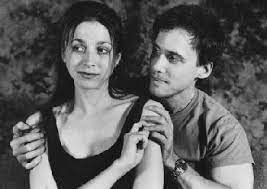
Julia Gibson's remarkable restaging of Craig Lucas's acclaimed 1984 play Blue Window is further evidence that instead of mounting lackluster new plays by such playwrights, maybe we should just relive their older, great ones. In the wake of David Rabe's horrifying The Dog Problem (a real dog if there ever was one on stage), David Mamet's trite The Old Neighborhood, and even Lucas's own misguided folly Stranger recently, we seem to need to be reminded of why we once thought they were great. With Rabe and Mamet, I'm pretty sure of it, but with Lucas, I was always a little apprehensive. It could just be my bad timing, I suppose; except for Stranger, I had only seen God's Heart at Lincoln Center by him, and that one provoked more walk-outs at my performance than a test screening of "Hudson Hawk." I have seen Reckless and Prelude to a Kiss in their film versions: interesting but lacking something. But now I see the error of my ways; Blue Window, in its scant but perfectly toned ninety minutes, is a work full and vibrant. Obviously written as a reactionary piece to the social climate of the time, that is, the intrusion of yuppie culture, therapy and the desire for love in the cold New York world, Blue Window seems even more about today, which could be why the material is so trenchant in 2001. We have, in a sense, gone back to the greedy `80s, and if you've watched the evolution (or de-evolution, depending on your viewpoint) of New York City in recent years, you'll also notice that it's full of people who don't know what they want, how to get it, and why the hell they're here in the first place. But in Lucas' expert wordplay, we don't get a smarmy patchwork of cliches about modernity and trendsetting. The play is filled with acidic exchanges and devilishly funny dissections of obnoxious behavior, but if that's all the play were, it would be an amusing trifle at best. What sticks in your gut is how much Lucas is in love with his lost souls, and though many of us may feel more comfortable without them, we can't help but deny that they exist and shape how we think and grow as people. If the 1984 production was better than this one, then I regret having missed out on the Golden Age of Theater. The cast is uniformly perfect, composed of Marin Hinkle, Neal Huff, Josh Stamberg, Marcia DeBonis, Hope Chernov, Katy Hansz, and Jason Kolotouros, all so good I wish I could devote a paragraph to each. Playing the various guests of the play's central dinner party thrown by shaken, suddenly toothless Libby (Hinkle), there is never a false note in their delivery. In fact, sometimes you marvel at how enthralling their rapport becomes, almost as if you're watching a documentary. And even more chilling is how much they all sound exactly like people you know, or used to know, or are trying to forget. Director Julia Gibson (a sometime actress as well, who recently appeared in Measure for Measure in Central Park to surprisingly good measure) stages with startling economy; there aren't twenty wasted seconds in the whole evening. And she also makes you pay attention to body language, which most directors seem to forget lately. That is one thing that makes theater so vital and exciting, and so many artists forget about it entirely. Gibson gives you a lot to watch, but no matter where your eyes dart to, you can bet there's something wonderful to be found in what you're looking at. The play is, sadly, running for a mere four weeks, though it's the kind of knockout production that should occupy a Broadway space. Short, sweet and something you should go out of your way for, this Window reflects pure gold.
